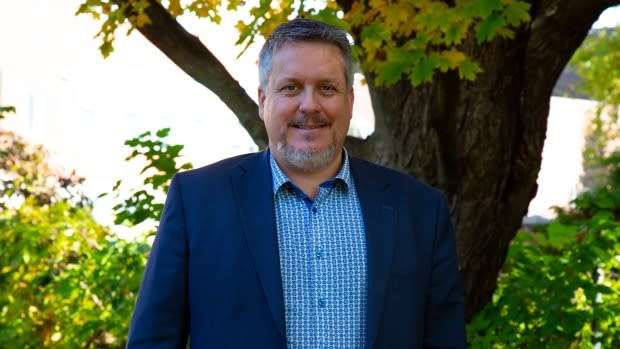High-speed internet access an election issue in the Laurentians
For Benoit St-Jacques, it's not unusual to wait more than 15 minutes to download a movie at his home in the Laurentians, where internet speed is heavily dependent on the number of other users — and the weather.
In the MRC d'Argenteuil, local officials have been working to get faster and more reliable internet deployed throughout the territory for years.
And years of complaints from St-Jacques about the quality of internet service in town have earned him his seat as president of the board of directors of Fibre Argenteuil: a new non-profit organization created by the Argenteuil municipal county to provide high-speed internet to the region.
"I think it's a right in 2019 for people to have access to high-speed internet," St-Jacques said, adding the quality of service currently available should not qualify as "high-speed."
He said he is forced to drive about 20 minutes to Lachute every day just to get internet service, and his girlfriend often drives about an hour to work in Laval, for better reception.

The Argenteuil county has received more than $9 million in grants — half from the federal government and half from the provincial government — to install 355 kilometres of fiber optic wire to provide high-speed internet to 4,250 homes.
But Gore Mayor and Argenteuil county warden Scott Pearce said the project hasn't been without obstacles.
He said an initial pilot project to get internet to 42 homes has taken almost two years.
"It doesn't bode well for the major project where we have over 4,000 houses where we want to deliver the service," he said. "I'm worried, I think we're all worried, and we need the government to stand up."
A lengthy infrastructure project
Pearce wants the government to put pressure on Telecom giants to better cooperate with municipalities on high-speed internet projects.
Otherwise, he said, they won't be able to finish the project within the time allotted in the government grants.
The existing infrastructure is owned by Hydro-Québec and Bell Canada, but Pearce said Argenteuil is paying for assessments, engineering reports, repairs, and eventually the cost of renting said infrastructure.
"That's where it gets a little out of hand financially, and I think unfair," said Pearce.
A single hydro pole outside the Lachute town hall will cost about $7,000 to assess and repair, and there are 355 kilometres worth of lines in the Argenteuil county, according to Stephane Jourdain, one of the men working on the Fibre Argenteuil project.
"I hope it's not the case for all the poles in the MRC because we don't have the budget," said Jourdain.
It will then cost about $150,000 annually to rent access to the network.
"Engineering design, depending on the complexity of the project, along with consent from all parties involved, can sometimes be a lengthy process," wrote Bell Canada spokesperson Caroline Audet in an email.
"After all approvals for a project have been granted, all companies involved in the construction project will work within the timelines prescribed by the agreements and the regulations governing the common use of poles."
Impacts on the community
Pearce said the lack of fast, reliable internet service has several impacts on Argenteuil communities. He said that, in Gore, parents and students sit in vehicles outside the community centre to get the parking lot's internet access.
"Is it normal that students have to sit in a car at –30 to do their homework? It's not right," he said. "It comes down to that: equality of opportunity."
"I'm disappointed in both levels of government at this point," he added.

Pearce also said it's difficult to attract new residents to Argenteuil, because people can't work from home and weekenders are hesitant to turn their cottages into full-time residences.
"When they find out we don't have internet, it's over," he said.
Pearce said that means less tax revenue coming in, and less opportunity for the communities and businesses to develop.
Reaction from party leaders
With election day around the corner, Pearce is watching what candidates in his riding, Argenteuil—La Petite-Nation, have to say about internet access.
"I would say for the party leaders that Canada includes all Canadians, and while the big cities with a higher population density don't have to invest for that service, we have to invest to get that service," Pearce said.
"And we're still being blocked, so they have to be a little more serious about it."
The Bloc Québecois and New Democratic Party candidates said high-speed internet access is an absolute priority.
The Green Party has promised to invest $400 million more for access; the local candidate, Marjorie Valiquette, said high-speed access is important but she has other priorities for the region, like public transit and more effective recycling programs.
The incumbent Liberal Party candidate called high-speed internet in the Laurentians a "mission accomplished," because federal funding is already on the table.
The Conservative Party candidate did not respond to a request for interview.
Funding announcement from the provincial government
On Friday, Quebec Economy Minister Pierre Fitzgibbon announced $100 million to bring high-speed internet to communities, which he said would serve 70,000 more homes.
But Pearce says dollars are not enough.
"I want them to start forcing the issue to get serious, because announcing numbers is great, but there is still no internet deployed in rural Quebec," he said.


